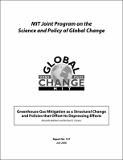Greenhouse Gas Mitigation as a Structural Change and Policies that Offset Its Depressing Effects
Author(s)
Babiker, Mustafa H.M.; Eckaus, Richard S.
DownloadMITJPSPGC_Rpt137.pdf (574.7Kb)
Metadata
Show full item recordAbstract
The current economic modeling of emissions limitations does not embody economic features that are likely to be particularly important in the short term, yet the politics of limiting greenhouse gas emissions are often dominated by relatively short term considerations. Moreover, only a few of these studies also consider policies that would offset the negative direct economic effects of those restrictions. This paper models the effects of restrictions on greenhouse gas emissions while embodying two of the most significant types of short term economic imperfections: sectoral rigidities in labor mobility and sectoral rigidities in wage adjustments. A labor policy is also analyzed that would reduce the direct negative economic effects of emissions restrictions.
For plausible estimates of the parameters, the model shows that with the labor market imperfections, if there were no offsetting policies, there would be as much as 4 per cent reductions in GNP in the U.S. in the first ten years after emissions restrictions were imposed. However, if there were two policies, instead of just one: a counteracting labor market policy, as well as the emissions restrictions, the negative direct economic effects could be completely eliminated.
Description
Abstract in HTML and technical report in PDF available on the Massachusetts Institute of Technology Joint Program on the Science and Policy of Global Change website (http://mit.edu/globalchange/www/).
Date issued
2006-07Publisher
MIT Joint Program on the Science and Policy of Global Change
Citation
Report no. 137
Series/Report no.
Report no. 137
Keywords
climate policy, emissions restrictions